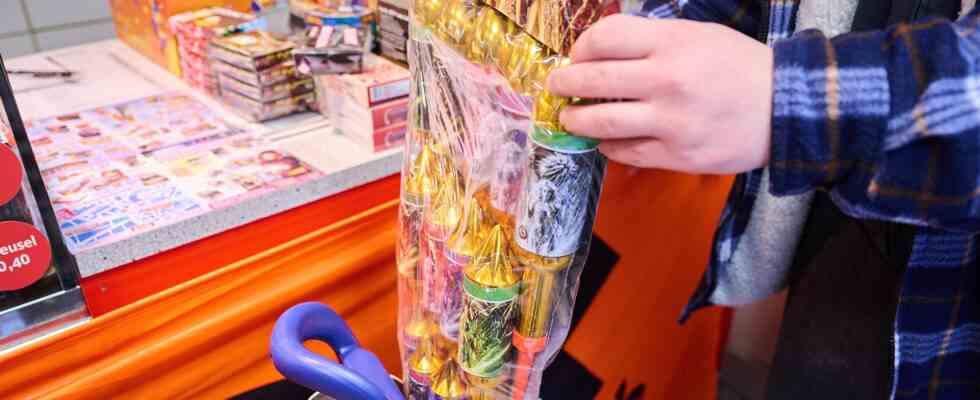Status: 12/29/2022 12:38 p.m
As of today, fireworks are back on the market in Germany – for the first time in more than two years. The fireworks industry is hoping for good sales. The debate about a firecracker ban continues.
For the first time in three years, retailers in Germany will start selling fireworks for New Year’s Eve this Thursday. In the two previous years, sales were prohibited in Germany due to the corona pandemic. The Association of the Pyrotechnic Industry (VPI) expects sales of around 120 million euros this year, about as much as before Corona. According to VPI, sales of around 130 million euros were achieved in 2019.
The aim of the double sales ban during the corona pandemic was not to additionally burden full hospitals with injuries from firecrackers. As a result of the bans, many pyrotechnic companies would have had to close or lay off staff, emphasizes the Federal Association for Pyrotechnics and Fireworks (BVPK). The sales bans in the Corona period hit the fireworks industry with around 3,000 employees hard, said VPI Managing Director Klaus Gotzen a few days ago. “More than 90 percent of our annual turnover is generated just three days before New Year’s Eve. If this turnover is missing, the existential basis is missing. For a long time, the economic survival of our industry was in question,” explained Gotzen.
“Fireworks tourism” expected from the Netherlands
In the German-Dutch border regions, too, many Dutch people are expected to buy firecrackers. He assumes that there will be heavy traffic at the border, said the managing director of the East Frisia retail association, Johann Doden, of the dpa news agency. It is about “fireworks tourism”. These buyers are important for the region because they often buy other products – not just fireworks.
The fireworks products offered in Germany from December 29th to 31st must be approved by the Federal Institute for Materials Research and Testing (BAM) or a comparable European authority. However, BAM recommends not buying fireworks abroad. Buyers must be at least 18 years old.
No firecracker zones in cities
Even if fireworks are allowed again – on December 31, certain areas for fireworks are still taboo: Many cities have set up no fireworks zones again. Take Hamburg, for example: firing rockets and firecrackers on New Year’s Eve around the Binnenalster and on the Rathausmarkt is prohibited here. No firecrackers may be taken into the prohibited zones between 6:00 p.m. and 1:00 a.m. Sparklers or crackers are permitted. In Berlin, there is a ban on fireworks and bangers, including around Alexanderplatz.
Calls for a ban on private fireworks
Environmental concerns are also repeatedly raised against the New Year’s fireworks. According to the Federal Environment Agency, around 2050 tons of fine dust are released every year when fireworks are set off – most of them on New Year’s Eve. Inhaling fine dust is a health hazard and affects the respiratory tract, for example.
The German Environmental Aid (DUH) calls for a ban on private fireworks. Federal Minister of the Interior Nancy Faeser (SPD) must realize that millions of animals and people as well as the environment are suffering from the fireworks and that more and more people therefore urgently want a ban.
According to the Federal Association for Pyrotechnics and Artificial Fireworks (BVPK), the ban demands are primarily aimed at abolishing a cultural practice. The increased fine dust concentration as a result of fireworks would only occur in a limited space and for a few hours, explained the BVPK chairman Ingo Schubert. He emphasizes that environmental and climate protection is a concern of the industry. “Residual fireworks are already 90 percent biodegradable – we want it to be 100 percent,” assured Schubert. The Association of the Pyrotechnic Industry (VPI) recently announced that it intends to completely dispense with plastic in the future.
Jürgen Resch from the German Environmental Aid describes the improvement efforts of the pyrotechnics industry as “insubstantial”. “For me, it’s a particularly brazen form of greenwashing,” he told the dpa news agency. Fireworks declared as sustainable also contain harmful substances that are harmful to the environment and health, such as black powder and chemicals, which are produced or released during combustion.
Police union warns of risk of accidents
The police union (GdP) is also in favor of a ban: if only because of the enormous production of pollutants and the mountains of garbage on the streets on New Year’s morning. This applies all the more in view of the high risk of accidents – especially under the influence of alcohol – as well as firecracker and rocket attacks against the police, fire brigade and rescue service.
In addition, there are repeated warnings about illegal fireworks. “Illegal firecrackers can lead to serious injuries. These often contain not only black powder, but are filled with a much more reactive flash composition or contain a significantly larger net explosive mass,” warns the Federal Institute for Materials Research and Testing. In addition, there is no guarantee that there will be enough time from the moment the firecracker is lit until the firecracker is ignited to reach the safety distance.

